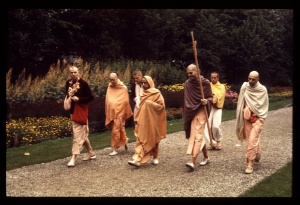SB 11.2.18

A.C. Bhaktivedanta Swami Prabhupada
TEXT 18
sa bhukta-bhogāṁ tyaktvemāṁ
nirgatas tapasā harim
upāsīnas tat-padavīṁ
lebhe vai janṛnabhis tribhiḥ
SYNONYMS
saḥ—he; bhukta—used up; bhogām—all the pleasures; tyaktvā—rejecting; imām—of this (earth); nirgataḥ—having left home; tapasā—by austerities; harim—the Supreme Lord, Hari; upāsīnaḥ—having worshiped; tat-padavīm—His destination; lebhe—he achieved; vai—indeed; janmabhiḥ—in births; tribhiḥ—three.
TRANSLATION
King Bharata rejected this material world, considering all types of material pleasure temporary and useless. Leaving his beautiful young wife and family, he worshiped Lord Hari by severe austerities and attained the abode of the Lord after three lifetimes.
PURPORT
The complete narration of the three lives of Bharata—as a king, as a deer and as an exalted paramahaṁsa devotee of the Lord—is given in the Fifth Canto of Śrīmad-Bhāgavatam.